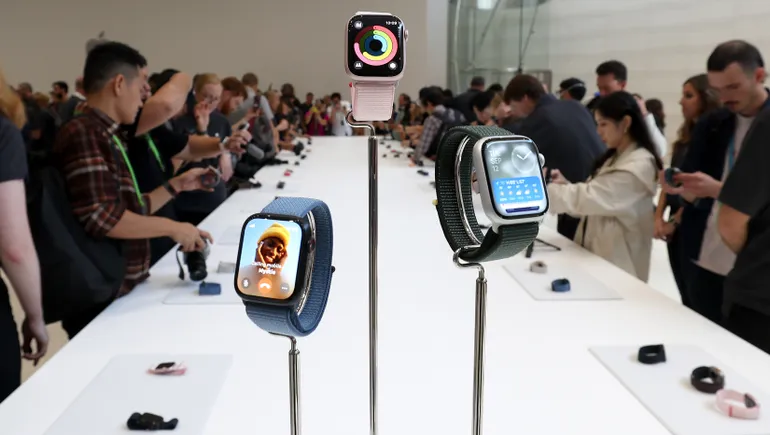Dive Brief:
- Apple plans to add sleep apnea notifications to its smartwatch this month, equipping the device to detect breathing disturbances.
- The new Apple Watch feature, which the company revealed Monday, is expected to receive Food and Drug Administration authorization soon and launch in more than 150 countries and regions, including the U.S., European Union and Japan.
- Apple unveiled the feature alongside new capabilities for its Airpods Pro 2 earbuds, which will be able to perform hearing tests and serve as an over-the-counter hearing aid once the company makes an update in the fall.
Dive Insight:
Apple has repeatedly added health-tracking capabilities to its smartwatch device since launching the first version of the product in 2015. Some of the expansions have spurred legal battles, with a challenge by Masimo forcing Apple to disable the blood oxygen function and Alivecor suing the company over its technology for detecting irregular heartbeats.
The latest health-focused update to Apple Watch will introduce “breathing disturbances,” a metric that uses the device’s accelerometer to detect small movements at the wrist associated with interruptions to normal respiratory patterns during sleep. Apple Watch will analyze the data every 30 days and alert users if there are consistent signs of moderate-to-severe sleep apnea.
Apple developed the algorithm using machine learning and data from clinical-grade sleep apnea tests. Researchers validated the feature in a clinical study, Apple said. Every participant who received an alert had at least mild sleep apnea.
The company expects to receive authorization from the FDA and other global health authorities soon and make the feature available this month. The 510(k) pathway is open because Samsung received de novo authorization for a smartwatch that can detect signs of sleep apnea in February.
Apple Watch users can download a PDF with data showing when sleep apnea may have occurred, three months of breathing disturbance data and other information for conversations with healthcare providers.
Resmed, Philips and other companies that sell devices to treat sleep apnea could benefit from the launch of smartwatches that detect the condition. Carlos Nunez, chief medical officer at Resmed, commented on Apple’s update in an emailed statement, saying that “smartwatch capabilities like these can be the impetus for those conversations that are oftentimes ignored.”
Speaking at a Morgan Stanley event last week, Resmed CEO Mick Farrell predicted Apple would add sleep apnea features within 12 months. The CEO said the addition of sleep apnea detection capabilities to wearables could trigger a “tidal wave” of patients and create “an opportunity of a generation.” Farrell added that “we probably need to have APIs and digital pathway integration from the Apple Health or the Google Health or the Samsung Health ecosystem to Resmed.”
Apple is also adding hearing capabilities to its Airpods Pro 2. A small clinical trial showed the potential for Apple earbuds to be used as a hearing aid in 2022.
The addition of hearing aid capabilities has two parts: First, Apple is adding a pure-tone audiometry test that uses the earbuds and an iPhone or iPad to allow users to check their hearing in five minutes at home. Second, Airpods Pro 2 can boost certain sounds based on the test results to correct mild-to-moderate hearing loss.
Apple expects to receive authorization for the features soon and make the capabilities available in more than 100 countries, including the U.S., in the fall. The company is also launching a hearing protection feature in the U.S. and Canada.

